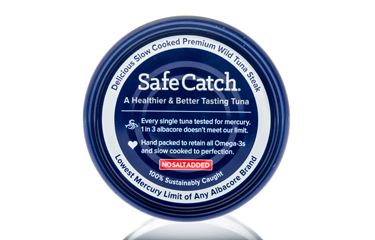Safe Catch tuna mercury ad claims panned as misleading by BBB, NFI

The Better Business Bureau’s National Advertising Division (NAD) has determined pouched and canned tuna supplier Safe Catch provided a “reasonable basis” for several mercury and sustainability ad claims, but recommended that others be modified or discontinued.
NAD is not affiliated with the Better Business Bureau. It is a division of BBB National Programs, an independent non-profit organization.
The National Fisheries Institute (NFI), a trade group representing the U.S. seafood industry including some of the largest processors of canned and pouched tuna in the United States, requested the review of Safe Catch’s ad claims.
“This is a significant ruling from BBB National Programs, and we are pleased with NAD’s determination that Safe Catch should discontinue or modify a variety of its misleading claims,” NFI Director of Communications Melaina Lewis told SeafoodSource.
The NAD said parts of Safe Catch’s advertising promotes the “unsupported and falsely disparaging message that other commercially available brands of tuna use fish that are dangerous.”
“This is a significant finding that will go a long way in getting rid of this hyperbolic and misleading message,” Lewis said.
NAD determined that the following ad claims from Safe Catch are acceptable: Every tuna used to make Safe Catch tuna products is tested for mercury, its tuna has the "lowest mercury" and "lowest mercury limit" of any brand, it has ”100 percent sustainably caught wild tuna,” and it “meets consumer reports 'low mercury' criteria set for sensitive populations, such as pregnant women and children.”
In addition, Safe Catch’s "healthier" tuna claim, which identifies that one of the ways in which the product can be considered "healthier" is that it is the "lowest mercury tuna,” is acceptable as is its "averaging 22 times lower than the FDA mercury action-limit" claim pertaining to both Safe Catch Elite (all skipjack tuna) and Safe Catch Yellowfin, as determined by independent lab testing.
The supplier may also continue to use the product name Safe Catch, the NAD ruled.
However, the NAD recommended that Safe Catch discontinue or modify a number of other marketing and advertising statements, including its "eight times lower than albacore tuna (FDA)" mercury claim on cans of Safe Catch Elite, the claim "22 times lower than the FDA's mercury limit" in a social media post, along with the claims "Safe Catch is the only seafood brand to align itself with the mercury standards of the medical community" and "our Elite Tuna has a strict limit that averages two times lower mercury than the recommendation for pregnant women and kids," in a press release.
Safe Catch should also discontinue using a “better-tasting” claim, claims by the American Pregnancy Association ("APA") that Safe Catch is the "only tuna endorsed by the American Pregnancy Association," and the "only seafood brand endorsed by the APA, its reference to "athletes" in the "Safe Catch Elite" graphic, and the "Best Choice-Clean Eating" and "Tuna Pick for Kids" claims.
Safe Catch will comply with all of NAD’s recommendations, it told NAD. The company said it “respectfully disagrees” with NAD's recommendation regarding its "Eight times lower than albacore tuna (FDA)" claim on cans of Safe Catch Elite, but it “respects the self-regulatory process and will take all of NAD's recommendations into account for future advertising,” according to NAD.
NAD determined a Safe Catch-generated graphic titled “Why test every tuna" reasonably conveys the unsupported and falsely disparaging message that other commercially available brands of canned or pouched tuna are dangerous because of their mercury levels and that they are impure, the organization said.
“Therefore, NAD recommended that the advertiser discontinue the graphic and that its advertising avoid the implication that consumers face significant health risks associated with eating tuna other than Safe Catch,” NAD said.
NAD also recommended the advertiser discontinue the endorsement claims by APA that Safe Catch is the "only tuna endorsed by the American Pregnancy Association," and the "only seafood brand endorsed by the APA,” in the “absence of any evidence that the APA exercised the level of scientific expertise or conducted the type of comparative health and safety testing typically necessary to support endorsement of a tuna brand,” NAD said.
However, Safe Catch can continue using the APA logo and communicating that its relationship with the APA is that of a corporate sponsor, using wording such as “Safe Catch is the official tuna of the American Pregnancy Association,” NAD said.
NFI lauded NAD’s decision that Safe Catch should discontinue the “false claim” that it is “the only seafood brand to align itself with the mercury standards of the medical community.”
“Canned tuna is a safe, healthy protein and attempts to highjack its wholesomeness by one brand have been exposed as absurd,” Lewis said.
NAD’s ruling also makes it clear that Safe Catch is not a better choice for “athletes,” for “clean eating,” or a recommended “tuna pick for kids,” according to Lewis.
NFI took issue with Safe Catch's use Parents Magazine’s logo, along with the quotes "Tuna Pick for Kids," and the Muscle and Fitness logo accompanied by the phrase "best choice, clean eating.”
“These pronouncements were all marketing claims that overstep the boundaries of accurate advertising,” Lewis said.
That NAD determined that Safe Catch does in fact test every tuna it uses is “hardly something to celebrate,” Lewis said.
“Companies are supposed to be doing what they claim they’re doing. The simple metric is do what you say and say what you do; a company shouldn’t be lauded for not misleading consumers about one aspect of their business.”
Photo courtesy of Keith Homan/Shutterstock






Share